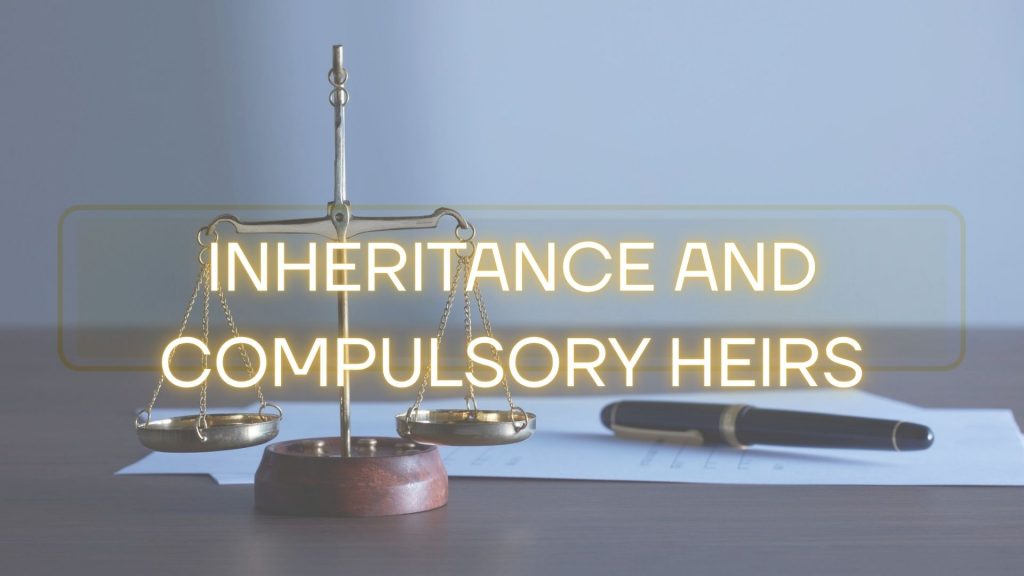You know that moment when a family member passes away, and instead of mourning, everyone immediately starts whispering about the mana? It’s tough. It’s messy. And honestly, it’s one of the biggest sources of family conflict in the Philippines.
But here’s the thing: that conflict usually happens because people didn’t plan, or they just didn’t understand the rules.

Protecting Your Family’s Future
Did you know that in the Philippines, you can’t just give away all your property however you want when you pass away? That’s right. If you’re a Filipino citizen, the law limits how you can distribute your wealth after death.
This is because of something called succession: the legal process that transfers your property, rights, and even debts to others when you die. Succession decides who your legal heirs are, either through a will or by law.
What makes the Philippines different is the Civil Code, which introduces the idea of Compulsory Heirs and a protected part of your estate called the Legitime. Think of the Legitime as the minimum share certain family members must receive, no matter what the will says. The law requires the person who made the will (called the testator) to follow these rules when naming heirs. Sometimes, the rules can be confusing, so the Supreme Court helps by interpreting the law and resolving tricky inheritance disputes.
My goal here is simple: to explain these complicated rules in everyday language so you can plan your estate wisely and help your family avoid messy fights after you’re gone.
Key Terms and Types of Succession
We can’t talk about planning without knowing the language. Don’t worry, these definitions are easy:
| Term | Definition |
|---|---|
| Compulsory Heirs | Your closest relatives: children, spouses, and parents, who absolutely cannot be deprived of their inheritance without a severe, legally specified cause. They have protected rights. |
| The Legitime (Mandatory Share) | The fixed portion of the estate reserved by law for those Compulsory Heirs. It is absolutely non-negotiable. |
| Free Portion (Disposable Part) | The residual portion of the estate that the Testator (the person making the will) can give to anyone they want: a favorite niece, a charitable foundation, or even a non-relative. |
| Testator/Decedent | The official term for the person who passed away and whose estate is being divided. A testator may institute his own heirs, who may be one or more persons, either by will or by law. |
| Intestate Succession | Happens automatically when someone dies without a valid will, or if their will doesn’t cover all of their assets. The Civil Code steps in and dictates exactly who gets what. |
| Testamentary Succession | When the distribution is based on a valid last will that you executed, you have taken control of the estate distribution. |
Unless a contrary intention appears, the words of a will are interpreted in their ordinary and grammatical sense.
The Heir Hierarchy and Specific Rights
Think of this as the line-up, the order of priority set by the law. It’s a hierarchy, and one level often excludes the next. When there are two or more heirs, the law provides for the division of shares among such persons according to their legal rights. Such person or persons may inherit together or by representation, depending on the circumstances.
1. The Top Priority: Primary Compulsory Heirs
These are the people the law protects first:
- Legitimate Children and Descendants: This includes your legitimate children and their children (your grandchildren).
- Rights of Children: Legitimate children have the strongest claims and receive the largest share of the Legitime.
- Right of Representation: This is important! If your child pre-deceases you, their children (your grandchildren) step into their shoes and inherit the share that your deceased child would have received. If a compulsory heir predeceases the testator, the law allows the descendants of that heir to inherit by right of representation. It’s how the line continues.
2. The Back-up: Secondary Compulsory Heirs
- Legitimate Parents and Ascendants: Your parents and grandparents fall here (legitimate ascendants include not only your parents but also your grandparents, who are entitled to inherit in the absence of legitimate children or descendants).
- Crucial Rule: They inherit only if you have absolutely no living legitimate children or descendants. If you have a legitimate child, even one, your parents get nothing from the Legitime.
3. Inherit Alongside Others: Concurring Compulsory Heirs
These two groups always get a share of the Legitime, regardless of whether primary or secondary heirs are present:
- Surviving Spouse: Your husband or wife. They are always a Compulsory Heir. The rights of the surviving spouse are determined in relation to the estate of the deceased spouse, and the law provides specific rules for the distribution of shares among the surviving spouse and other heirs.
- Illegitimate Children and Descendants: Children born outside of a valid marriage. While they have limited rights compared to legitimate children, they are absolutely protected by law. Their share is generally half of a legitimate child’s share.
| Order of Preference: Just remember this: if a primary heir is present (a child), the secondary heirs (the parents) are generally excluded. |
Rights of the Surviving Spouse
The surviving spouse holds a unique and protected position under the Civil Code of the Philippines as a compulsory heir. Their inheritance rights are guaranteed and cannot be ignored or overridden.
Share of the Surviving Spouse Based on Other Heirs
The amount the surviving spouse receives depends on the presence of other compulsory heirs:
| Presence of Other Heirs | Surviving Spouse’s Share | Notes |
|---|---|---|
| With legitimate children or descendants | Equal to the share of one legitimate child | The estate is divided equally among the surviving spouse and the legitimate children |
| No legitimate children but with legitimate parents or ascendants | One-half of the estate | The other half goes to the legitimate parents or ascendants |
| With legitimate and illegitimate children | Adjusted the share to fairly divide the estate among all compulsory heirs | An illegitimate child’s share is generally half that of a legitimate child |
Key Points on the Surviving Spouse’s Rights
- Always a compulsory heir: The surviving spouse is entitled to a share regardless of other heirs.
- Equal share with legitimate children: When legitimate children exist, the surviving spouse’s share equals that of each legitimate child.
- Shares with parents or ascendants: If there are no legitimate children, the surviving spouse shares the estate with the deceased’s legitimate parents or ascendants.
- Adjustment with illegitimate children: The surviving spouse’s share is adjusted when illegitimate children are present to ensure fair distribution.
Rights Beyond the Estate Share
- Conjugal Property or Absolute Community Property:
- The surviving spouse is entitled to half of the conjugal or absolute community property acquired during the marriage.
- The remaining half forms part of the estate to be divided among all compulsory heirs.
- Administration Role:
- The surviving spouse may be appointed as executor or administrator of the estate.
- Responsibilities include settling debts, paying taxes, and ensuring rightful distribution to all compulsory heirs.
- Usufruct Rights:
- Right to Support:
- The surviving spouse may be entitled to support from the estate, especially if in need.
Philippine inheritance law ensures that the surviving spouse is treated fairly and receives a rightful share of the estate. Whether the estate includes separate property, absolute community property, or a combination, the law provides clear rules to divide the estate equally and justly among all compulsory heirs, protecting the property and the dignity and security of the surviving spouse.
Calculating the Shares: How Much Does Each Heir Get?
This is where things get practical. Before we divide anything, you have to value the entire estate. All the property, rights, and interests of the decedent are included in the estate, and the law requires the distribution of all his estate among the heirs. All the interests of the decedent in real and personal property must be considered in the valuation and distribution process.
A. Valuing the Estate
Before we divide anything, you have to value the entire estate. This is the Gross Estate at the time of death, minus all outstanding debts, taxes, and funeral charges. Such property includes all assets, whether real or personal, that form part of the decedent’s estate. That net amount is the value we’re dividing.
B. The Distribution Framework
Think about the Legitime as an unbreakable shield. The law first carves out the Legitime: the mandatory shares; and only then looks at the Free Portion. The law requires the estate to be distributed in such a manner and in such a way as to ensure that the legitime is protected, and the free portion is disposed of in the exact manner stated by the testator or by law.
C. Primary Scenarios and Actual Shares
The shares get complicated when you mix and match, but here are the most common scenarios:
| Scenario | Legitimate Child (LC) Share | Surviving Spouse (SS) Share | Illegitimate Child (IC) Share | Free Portion |
|---|---|---|---|---|
| Scenario 1: 1 LC + SS | 1/2 of the estate | Equal to the LC (1/2) | 0 | 0 |
| Scenario 2: 2 LCs + SS | 1/2 of the estate (divided equally) | Equal to one LC | 0 | The rest |
| Scenario 3: SS + Legitimate Parents (No LCs) | 0 | 1/2 of the estate | 0 | 1/4 of the estate |
| Scenario 4: 1 LC + SS + 1 IC | 1/2 of the estate | Equal to the LC (1/2) | 1/2 of the LC’s share (1/4) | The rest (if any) |
The most common split is 1/2 for the Legitime and 1/2 for the Free Portion, but the proportions shift dramatically depending on the combination of heirs.
| Note: The shares of heirs may also be affected by whether the decedent was in a first or subsequent marriage. The law provides specific rules for the rights of heirs in cases of subsequent marriage, which can impact the inheritance rights of the surviving spouse and children, especially regarding the legitimacy of children and the entitlements established in a first or subsequent marriage. |
Estate Planning: Using the Free Portion
Since the Legitime is protected by law and cannot be touched, as a Testator, your control is limited to the Free Portion: that part of the estate you can freely give away through your will. A valid will lets you express your wishes after death, but it must meet legal standards. The testator must clearly and explicitly state their intentions. The wording of the will should be understood in its technical meaning unless the testator clearly indicates otherwise.
A. The Power of a Will
A valid Will is your voice after death. It allows you to designate which property goes to which person, allocate specific gifts, and most importantly, name the administrator of your estate (the executor). Making a will is a strictly personal act and cannot be delegated; the testator must personally perform and participate in the testamentary act. In the case of a notarial will, such witnesses must be competent, and all the pages of the will must be properly signed and attested to ensure its validity. You can control the distribution of the Free Portion, often up to 50% of your estate.
B. Types of Wills in the Philippines
- Notarial Will: This is the formal one. It requires signing before a notary, three credible witnesses, and strict legal requirements. The law also requires the presence of the competent witness referred to in the Civil Code for the will to be valid. It’s the safest route, but it’s formal.
- Holographic Will: This is the simpler option. It must be handwritten, dated, and signed entirely by the Testator. No witnesses are needed, but if even a single word is typed or written by someone else, the entire Will is void! Use this with extreme caution.
C. Impairment of the Legitime
What if you’re feeling generous and gift your favorite grandchild a house before you die, but that gift eats into the Legitime of your other children? The law won’t allow it. That house gift will be legally reduced (or impaired) to restore the Compulsory Heir’s rightful share. The law protects not only the shares of the primary compulsory heirs but also those of other compulsory heirs, ensuring that all compulsory heirs receive their legitime as mandated by the Civil Code. You can’t bypass the Legitime through inter vivos (lifetime) donations, either.
Disinheritance: The Legal Exception
Can you remove a Compulsory Heir entirely? Yes, but it is incredibly difficult to pull off successfully in court. A will may also be invalidated if it is shown that it was executed under undue and improper pressure, which undermines the free will of the testator.
A. The Requirement
You can only remove a Compulsory Heir for causes strictly specified by the Civil Code Section 6 Article 916 in relation to Articles 919-921, and you must do it through a valid Will. You can’t just write them out in a letter. Clear and satisfactory proof is required to establish the grounds for disinheritance.
B. Strict Requirements
The Will must explicitly state the specific cause for the disinheritance, and that cause must perfectly align with the law. The will must also clearly identify the compulsory heir to whom the disinheritance concerns such a person. This is where most attempts fail; the cause often isn’t severe enough or isn’t proven correctly.
C. Common Legal Causes for Disinheritance
The law considers things like:
- Physical abuse or serious defamation.
- Conviction of a crime involving civil interdiction (serious jail time).
- Refusal to support the parent/ascendant without just cause (like a child failing to provide necessary support).
The acts or omissions justifying disinheritance must be of such a nature as to warrant exclusion under the law.
Summary of Disinheritance Causes and Grounds
| Who Can Be Disinherited | Grounds for Disinheritance |
|---|---|
| Child or Grandchild | – Attempted murder or serious harm to the testator or family members |
| – False accusation of serious crime (6+ years imprisonment) | |
| – Adultery or concubinage with the testator’s spouse | |
| – Forcing the testator to make or change will through fraud, violence, or intimidation | |
| – Unjustified refusal to provide financial support to the testator | |
| – Maltreatment (verbal or physical) of the testator | |
| – Leading a dishonorable or disgraceful life | |
| – Conviction resulting in civil interdiction | |
| Parent or Grandparent | – Abandoning children or leading daughters into an immoral life |
| – Attempted murder or serious harm to the testator or family members | |
| – False accusation of serious crime (6+ years imprisonment) | |
| – Adultery or concubinage with the testator’s spouse | |
| – Forcing the testator to make or change will through fraud, violence, or intimidation | |
| – Loss of parental authority for legal reasons | |
| – Unjustified refusal to provide financial support to children or grandchildren | |
| – Attempted murder of spouse by one parent (unless reconciled) | |
| Spouse | – Attempted murder or serious harm to the testator, children, or parents |
| – False accusation of serious crime (6+ years imprisonment) | |
| – Forcing the testator to make or change will through fraud, violence, or intimidation | |
| – Acts constituting grounds for legal separation (e.g., abuse, infidelity, addiction) | |
| – Grounds for loss of parental authority | |
| – Unjustified refusal to provide financial support to children or the testator |
Note: Disinheritance is a serious legal action reserved for grave misconduct or manipulation against the testator or their immediate family. If a disinherited heir has children, those children may still inherit by representation.
D. Effects of Disinheritance
If the disinheritance is declared valid, the heir loses their share. However, if that disinherited heir has children, their children still get their share via representation. You can’t hold a grudge against your grandchild for your child’s actions!
Additionally, the law protects omitted compulsory heirs by ensuring that their legitime is preserved even if they are not expressly mentioned in the will.
The Settlement Process and Mandatory Taxes
Once the Testator passes, the work begins.
A. Estate Distribution
The final division of the assets: the land, the bank accounts, the businesses, must strictly follow the shares dictated by law (Intestate) or the Will (Testamentary), while respecting the Legitime. In the distribution of the estate, only such dispositions as are permitted by law or by will may be given effect.
B. Extrajudicial Settlement (EJS)
When can you avoid court? Generally, if: 1) there is no Will, 2) there are no outstanding debts, and 3) all Compulsory Heirs are of legal age and agree 100% on the division. This is the fastest, cheapest route.
C. Judicial Settlement
If the heirs disagree, if there is a Will that needs to be proven (probated), or if the estate has complex debts, you’ll need the court to intervene. In such cases, the court may appoint a person requested by the heirs or as required by law to administer the estate during judicial settlement. It’s slow, but sometimes necessary.
D. Mandatory Tax Obligation (Estate Tax)
Look, taxes are non-negotiable.
- What is Estate Tax? It’s a tax imposed on the right to transfer property upon death. It’s not a tax on the property itself, but on the transfer.
- Deadline: The Estate Tax Return must be filed within one year from the date of the decedent’s death. This deadline is strict and cannot be extended, except in special cases where the Commissioner may grant a one-time extension of up to 30 days for valid reasons.
- Rate: Since the TRAIN Law, the rate is a simplified, reduced flat rate of 6% of the net taxable estate.
Final Thoughts
The Legitime is central to Philippine law; it acts as a foundational protection for family members, and you simply cannot circumvent it.
My final thought is this: while the law is complex, understanding that fundamental structure is essential for effective estate planning. Don’t leave your family to untangle this legal mess during their most vulnerable time.
You really need to talk to a lawyer or an estate planner. Don’t use a random template you found online.
For reliable assistance with your estate planning and to ensure your assets are distributed according to Philippine inheritance and compulsory heirs laws, visit HousingInteractive, the Philippines’ first property portal, delivering property solutions tailored to your needs.

























